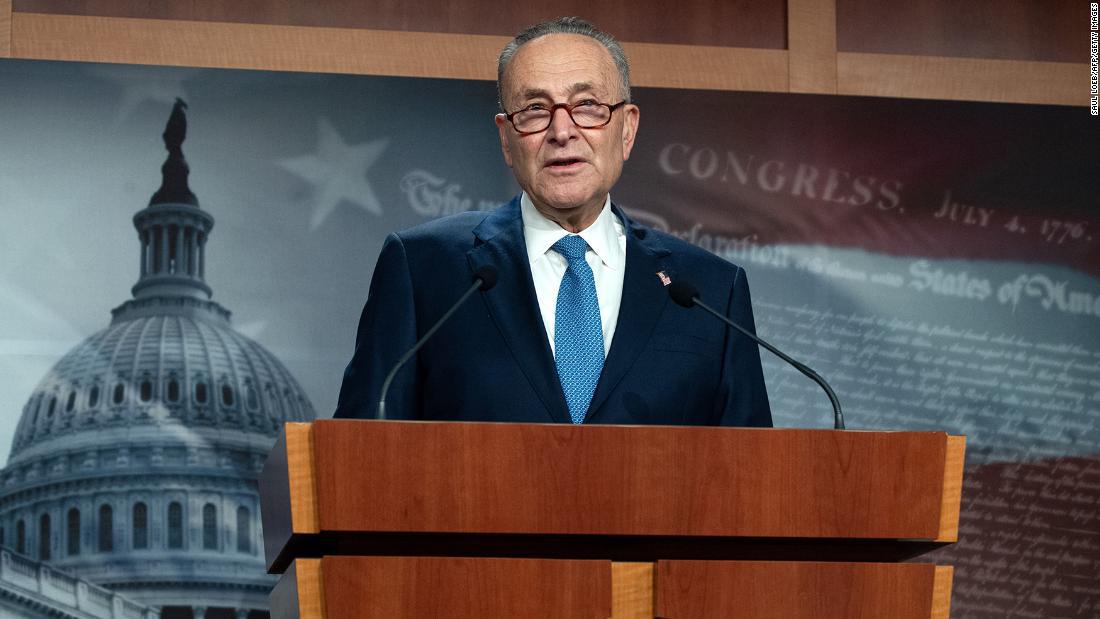US and China: Resuming Trade Talks?
0:52
(CNN) -
The Senate passed unusual bipartisan legislation Tuesday aimed at countering China's growing influence by investing more than $ 200 billion in American technology, science and research. The final vote was 68-32. Independent Senator Bernie Sanders of Vermont was the only member of the Democratic caucus to vote against the bill.
Nineteen Senate Republicans joined Democrats who voted for passage.
The passage is a victory for Majority Leader Chuck Schumer, a New York Democrat who co-wrote and strongly supported the measure, and President Joe Biden, who made cross-sector collaboration a central promise of his strategy. of government, although he has faced criticism for advancing unilaterally on the most important points of his agenda so far.
The broad legislation, called the US Competition and Innovation Act, aims to address China's influence on multiple fronts and "will enhance American innovation and preserve our competitive advantage for future generations," Schumer said.
The bill has yet to be approved by the House of Representatives before it reaches Biden's table.
House Foreign Affairs Speaker Gregory Meeks introduced a similar bill last month, but it's unclear when it will be voted on.
The final vote on the competition bill was delayed until after the Memorial Day recess to accommodate Republican critics of the bill who insisted on having more time in the room to voice their concerns.
That delay allowed the Senate to vote on the advancement of the commission's legislation from January 6, which failed last month after Republicans blocked the bill.
Senate Republicans Block Bill to Create Jan.6 Commission
Many top Senate Republicans, including minority leader Mitch McConnell, warned for weeks that they would block the legislation unless they got more votes for the GOP-backed amendments.
Before the bill was passed on Tuesday, McConnell again argued that Schumer closed the debate on the bill too early and that the legislation is "incomplete."
advertising
Despite this concern, the Kentucky Republican stressed the importance of the legislation, saying it "touches on key issues that will help determine our strategic position for decades."
He added that "it includes several smart selective measures, but leaves many more on the table, so it will move forward as an imperfect approach to a challenge of extreme importance."
Schumer has vigorously rebutted criticism from the Republican Party and pointed to a long list of amendments to the bill that had been voted on up to that point, including 18 Republican amendments and four Democrats.
Senators from the Republican Party weren't the only ones who wanted to see changes in the bill.
Sanders had raised concerns about various provisions, including the $ 10 billion in funding authorized for NASA that would likely benefit Jeff Bezos' space company, as well as tens of billions for the US semiconductor industry.
The effort was the product of multiple Senate committees, making it one of the few areas of successful bipartisan cooperation in the Senate. The basis for the bill comes from legislation Schumer and Indiana Republican Senator Todd Young introduced together last year, called the Endless Frontier Act.
The Schumer and Young bill, which included investments in a new technology direction at the National Science Foundation to spur US technological innovation, joined bipartisan legislation by the Senate Foreign Relations Committee. called Law of Strategic Competition.
The Senate package also includes a $ 54 billion investment to stimulate the U.S. semiconductor industry, according to an estimate by the Congressional Budget Office, to challenge China's growing superiority in manufacturing and supply chains. global supply.
There are additional investments in cybersecurity and biotechnology, according to a summary by Senate Democrats.
Semiconductors, new target in US-China 1:50 dispute
Other components of the bill include the US $ 10 billion investment over five years to the Commerce Department to create regional technology center programs, a third of which would have to be located in rural areas.
The legislation also requires that iron, steel, manufactured products, and building materials used in federally funded infrastructure projects be produced in the United States.
The bill will also serve to consolidate the "Made in America" office that Biden created earlier this year by decree.
White House officials closely followed, and participated, in the process of drafting and modifying a bill that they urged lawmakers to bring to Biden's table.
The bill serves multiple purposes for the White House, which has sought to increase economic capacity in the face of a rising and increasingly competitive China.
Perhaps most important to Biden, the measure supports a significant portion of his $ 4 trillion legislative priorities in research and development and manufacturing.
White House officials believe that moving other elements of the blanket proposal separately creates more space for the other elements of Biden's economic agenda.
The measure underwent significant changes before reaching plenary, and attracted many kinds of policy provisions, being one of the few bills likely to become law this year.
When the Senate Committee on Commerce, Science, and Transportation debated and amended the Endless Frontier Act, many elements were added, including a provision on labeling the country of origin of king crab and another to prohibit transportation, sale, or purchase. of shark fins.
The committee added the NASA Authorization Act to the legislation, along with a $ 10 billion authorization for NASA's Artemis lunar lander program likely to benefit Blue Origin, a company owned by Amazon's Bezos that has its headquarters in the home state of Senate Commerce Speaker Maria Cantwell, a Democrat from Washington.
Jeff Bezos wants Blue Origin to go to the Moon: here's why this matters
Young disapproved of a committee measure to divert funds from the National Science Foundation for technology direction to the Department of Energy's National Laboratories, pushed by senators with national laboratories in their states, but supported the measure anyway.
Once the legislation reached plenary, many more amendments were added, and voting took place in the late afternoon.
The Senate passed several Republican amendments by voice vote Tuesday, including one by Senator Rand Paul of Kentucky to ban the National Institutes of Health from funding "function gain" research in China, an amendment by Iowa Senator Joni. Ernst blocking any federal funding for the Wuhan Institute of Virology and an intellectual property provision from Montana Senator Steve Daines.
- CNN's Kristin Wilson, Clare Foran and Katie Lobosco contributed to this report.
DevelopmentResearch






